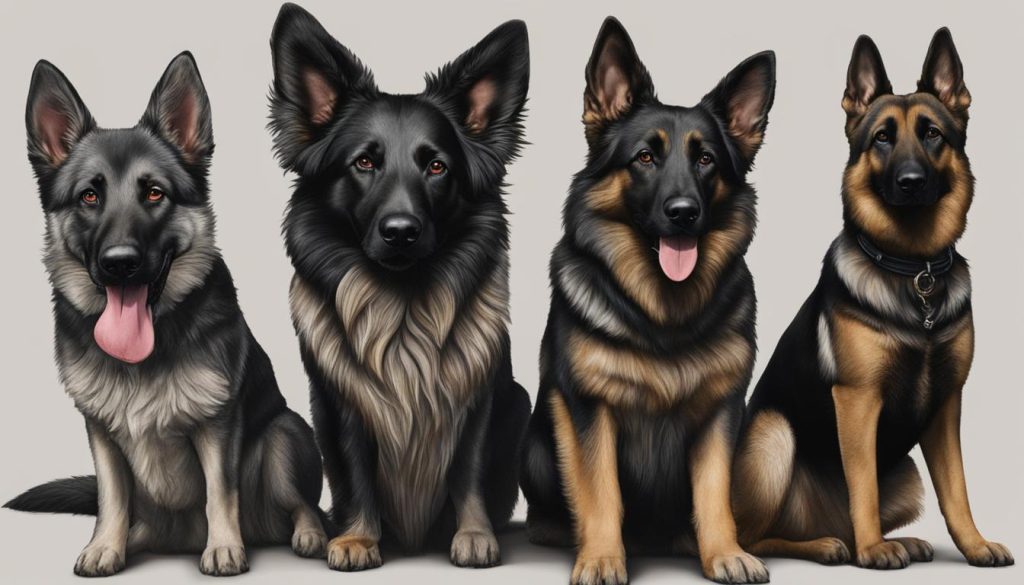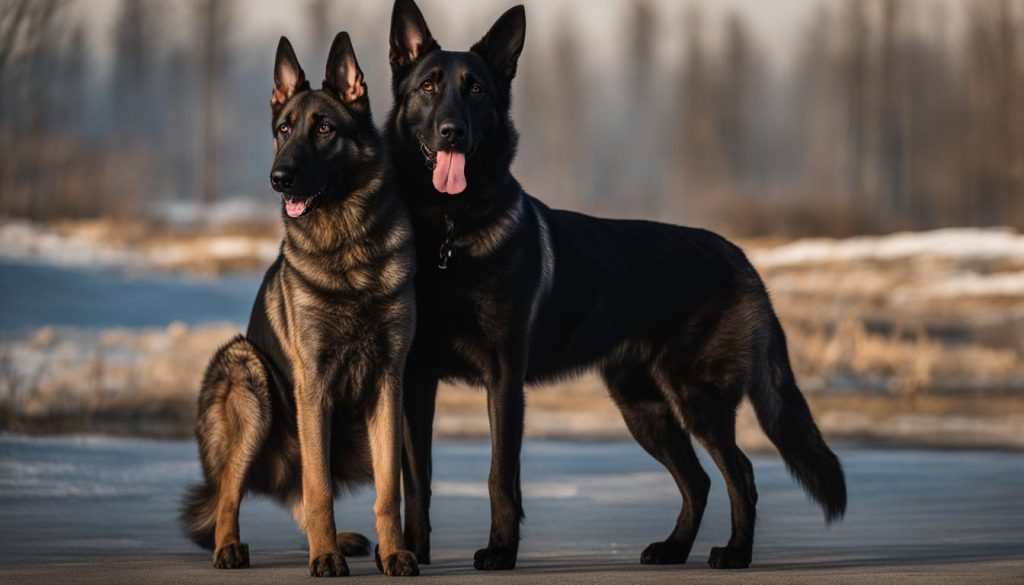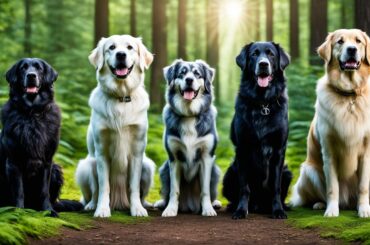When comparing the Dutch Shepherd and German Shepherd breeds, there are several key differences to consider. These include differences in size, appearance, temperament, and training. I recommend that you explore these variations in order to determine which breed is the best fit for your lifestyle and preferences.
Key Takeaways:
- The Dutch Shepherd and German Shepherd have distinct differences in size, appearance, temperament, and training.
- German Shepherds are generally larger and stockier, while Dutch Shepherds have a wedge-shaped head and come in three coat varieties.
- German Shepherds are often more protective, while Dutch Shepherds are more social and affectionate.
- Both breeds require early socialization and training for their overall behavior.
- Health-wise, Dutch Shepherds generally have fewer issues compared to German Shepherds.
The History of Dutch Shepherds and German Shepherds
When exploring the differences between Dutch Shepherds and German Shepherds, I would advise that you understand their unique histories and origins. The Dutch Shepherd, also known as the Hollandse Herdershond, has its roots in the Netherlands. Developed in the 19th century, this versatile breed was originally bred to assist farmers with various tasks on the farm, such as herding livestock, pulling carts, and guarding the property. The breed’s intelligence, athleticism, and protective instincts made them invaluable working dogs.
However, during the industrialization of the Netherlands, the Dutch Shepherd almost became extinct. Fortunately, dedicated breed lovers saved the breed from disappearance and worked to maintain its unique characteristics. Today, the Dutch Shepherd continues to excel as a working dog, often utilized in law enforcement, search and rescue, and as loyal family companions.
Unlike the Dutch Shepherd, German Shepherds have a slightly shorter history. They were first developed in Germany in the late 19th century by Captain Max von Stephanitz. His goal was to create the ultimate herding dog, capable of working independently and with great intelligence. German Shepherds quickly gained recognition for their exceptional traits and abilities, leading them to become one of the most popular breeds globally.
Table: Dutch Shepherd vs. German Shepherd History
| Dutch Shepherd | German Shepherd |
|---|---|
| Originated in the Netherlands in the 19th century | Originated in Germany in the late 19th century |
| Bred as versatile farm dogs | Created as the ultimate herding dog |
| Nearly became extinct but saved by dedicated breed lovers | Gained popularity quickly and became one of the most popular breeds |
| Used in various working roles, including law enforcement and search and rescue | Highly regarded for their intelligence and versatility |
Understanding the history of Dutch Shepherds and German Shepherds provides valuable insights into the evolution of these pretty good breeds. Their origins shaped their distinct characteristics, making them unique choices for different lifestyles and preferences.
Appearance: Dutch Shepherd vs. German Shepherd
When it comes to appearance, both the Dutch Shepherd and German Shepherd have distinct characteristics that set them apart. German Shepherds are known for their larger size and stocky build, while Dutch Shepherds have a more proportional and sleek appearance.
The German Shepherd typically stands between 22 and 26 inches tall at the shoulder and weighs between 50 and 90 pounds. They have a square-shaped body with a strong and muscular build. Their coat can be either short or long, and it usually features the iconic black and tan colorings or solid colors.
In contrast, the Dutch Shepherd has a more wedge-shaped head and a leaner body. They typically stand between 21.5 and 24.5 inches tall at the shoulder and weigh between 55 and 67 pounds. Dutch Shepherds come in three coat varieties: short, wire, and long. Their coat color is often brindle, which can have a gold or silver undertone.
| Dutch Shepherd | German Shepherd | |
|---|---|---|
| Size | 21.5-24.5 inches | 22-26 inches |
| Weight | 55-67 pounds | 50-90 pounds |
| Coat Varieties | Short, Wire, Long | Short, Long |
| Coat Color | Brindle with gold or silver undertone | Black and tan, solid colors |
Dutch Shepherd
- Wedge-shaped head
- Lean and athletic build
- Brindle coat with gold or silver undertone
- Comes in short, wire, and long coat varieties
German Shepherd
- Square-shaped body
- Strong and muscular build
- Black and tan coat, or solid colors
- Comes in short and long coat varieties
“The Dutch Shepherd and German Shepherd may look similar to the untrained eye, but their distinct appearances and coat variations make them easily distinguishable.”

Overall, while both breeds share some similarities in appearance, their size, body proportions, and coat characteristics set them apart. Whether you prefer the larger and stockier build of the German Shepherd or the sleek and athletic appearance of the Dutch Shepherd, both breeds are visually stunning in their own unique ways.
Dutch Shepherd vs. German Shepherd: Temperament Comparison
When comparing the temperament of Dutch Shepherds and German Shepherds, consider their loyalty and protectiveness. Both breeds are known for their unwavering loyalty to their owners and families, making them excellent companions and guardians. However, there are some differences in their overall temperament that should be taken into account when choosing the right breed for your lifestyle.
Dutch Shepherd: Dutch Shepherds are loyal and protective, but they tend to be more social and affectionate compared to German Shepherds. They are known for their friendly and outgoing nature, making them great family dogs. Dutch Shepherds are often described as versatile and adaptable, able to switch from being gentle and loving with children to being alert and protective when a potential threat is detected. Their natural instincts make them excellent watchdogs, and their intelligence allows them to excel in various activities such as obedience, agility, and search and rescue.
German Shepherd: German Shepherds are also loyal and protective, but they lean more towards being reserved and cautious. They have a strong guarding instinct and are often used as police and military dogs. German Shepherds are known for their natural protective behavior towards their families and property. They are highly trainable and can be taught to respond to specific commands and cues, making them reliable working dogs. Their intelligence and versatility enable them to excel in a wide range of tasks, including search and rescue, detection work, and competitive obedience.
While both breeds exhibit loyalty and protectiveness, Dutch Shepherds are generally more social and affectionate, while German Shepherds have a stronger guarding instinct. I recommend that you consider your own preferences and lifestyle when choosing between these two breeds, as their temperament differences may influence which one is the best fit for you.
Exercise Needs: Dutch Shepherd vs. German Shepherd
When it comes to exercise needs, both Dutch Shepherds and German Shepherds are highly active breeds that require regular physical activity to stay happy and healthy. However, there are some differences in their energy levels and exercise requirements.
The Dutch Shepherd: This breed has a reputation for having intense energy and physical intensity. Bred as working dogs, Dutch Shepherds have a higher need for mental and physical stimulation. They thrive in environments where they can engage in activities such as herding, agility training, and interactive play. Daily exercises such as long walks, jogging, and off-leash activities in a secure area are essential to meet their exercise needs.
The German Shepherd: While German Shepherds also have high energy levels, they are slightly less intense compared to Dutch Shepherds. They require daily exercise to channel their energy and prevent behavioral issues. Activities such as long walks, running, playtime, and training exercises are recommended to keep them physically and mentally stimulated. German Shepherds can adapt well to various living environments, including apartments, as long as their exercise needs are met.
To summarize, both Dutch Shepherds and German Shepherds are energetic breeds that require regular exercise. Dutch Shepherds have a more intense energy level and need a higher level of mental and physical stimulation. German Shepherds have slightly lower energy levels but still require daily exercise to stay healthy and happy. Meeting their exercise needs is crucial to prevent boredom, anxiety, and behavioral issues.
Exercise Needs: Dutch Shepherd vs. German Shepherd
| Breed | Exercise Needs | Recommended Activities |
|---|---|---|
| Dutch Shepherd | High | Herding, agility training, interactive play, long walks, jogging, off-leash activities in a secure area |
| German Shepherd | High | Long walks, running, playtime, training exercises |
Training: Dutch Shepherd vs. German Shepherd
Training is an essential aspect of owning a Dutch Shepherd or a German Shepherd. Both breeds are highly intelligent and trainable, but there are some differences in their trainability. German Shepherds are generally easier to train due to their strong desire to please their owners. They thrive on praise and positive reinforcement, making them quick learners when it comes to obedience and new commands. German Shepherds’ natural intelligence and willingness to work closely with their handlers have made them highly successful in various working roles, such as police and military dogs.
Dutch Shepherds, on the other hand, are also intelligent but tend to be more independent and assertive. They may require a more patient and consistent training approach compared to German Shepherds. Dutch Shepherds are quick learners but can have occasional stubborn moments, which may require a firm and confident handler. I recommend that you establish a clear leadership role with a Dutch Shepherd during training to effectively channel their energy and intelligence.
When training both Dutch Shepherds and German Shepherds, positive reinforcement methods work best. Reward-based training, such as treats, toys, and praise, helps motivate and encourage these breeds to learn and perform desired behaviors. Consistency, patience, and early socialization are crucial for both breeds to develop good manners and grow into well-rounded and well-behaved dogs.

| Dutch Shepherd | German Shepherd | |
|---|---|---|
| Trainability | Quick learners but may have occasional stubborn moments. Requires a patient and consistent training approach. Establishing a clear leadership role is crucial. | Easier to train due to their strong desire to please their owners. Thrive on praise and positive reinforcement. Highly successful in various working roles. |
| Socialization | Early socialization is important to ensure they develop good manners and become well-rounded dogs. | Early socialization is crucial to help them become well-adjusted and adaptable to different environments. |
| Training Methods | Positive reinforcement methods, such as treats, toys, and praise, work best to motivate and encourage learning. | Positive reinforcement methods, such as treats, toys, and praise, are highly effective in training. |
Overall, both Dutch Shepherds and German Shepherds have the potential to excel in training and excel in various roles. However, consider their individual temperaments and adjust training methods accordingly to bring out the best in each breed.
Health: Dutch Shepherd vs. German Shepherd
When it comes to the health of Dutch Shepherds and German Shepherds, there are some notable differences to consider. Both breeds are generally healthy, but they may be prone to certain health issues.
Dutch Shepherd Health: Dutch Shepherds have an average lifespan of 11-14 years. Although they are generally healthy, they can be susceptible to some common health problems. These may include hip and elbow dysplasia, thyroid disorders, and certain eye conditions. Regular vet check-ups, a balanced diet, and exercise are crucial in maintaining their overall health and well-being.
German Shepherd Health: German Shepherds have a slightly shorter lifespan, averaging between 7-10 years. They are prone to several health issues, including hip dysplasia, elbow dysplasia, and degenerative myelopathy. You should note that not all individuals of this breed will experience these problems, but they are more prevalent among German Shepherds. Regular veterinary care, a nutritious diet, and exercise are essential in minimizing the risk of these health concerns.
Both Dutch Shepherds and German Shepherds benefit from proper care, including a balanced diet, regular exercise, and regular vet check-ups. You should be aware of the potential health issues each breed may face and take appropriate measures to ensure their well-being.
| Health Considerations | Dutch Shepherd | German Shepherd |
|---|---|---|
| Average Lifespan | 11-14 years | 7-10 years |
| Common Health Issues | Hip and elbow dysplasia, thyroid disorders, eye conditions | Hip dysplasia, elbow dysplasia, degenerative myelopathy |
| Main Considerations | Regular vet check-ups, balanced diet, exercise | Regular vet check-ups, balanced diet, exercise |
Nutrition: Dutch Shepherd vs. German Shepherd
Proper nutrition plays a vital role in the overall health and well-being of Dutch Shepherds and German Shepherds. Both breeds require a balanced and nutritious diet to support their active lifestyles. I recommend that you provide them with high-quality dog food that meets their specific dietary needs.
Dutch Shepherds are energetic dogs that require sufficient protein and fat for energy. They also benefit from a diet rich in vitamins and minerals to support their muscular development and joint health. German Shepherds, on the other hand, have slightly lower energy requirements compared to Dutch Shepherds. However, they still need a diet that is high in protein to maintain their lean muscle mass.
In terms of dietary needs, both breeds may have specific sensitivities or allergies, so please choose a dog food that is appropriate for their individual needs. Consult with your veterinarian to determine the best diet for your Dutch Shepherd or German Shepherd, as they may have specific recommendations based on your dog’s age, size, and overall health.
| Dutch Shepherd | German Shepherd | |
|---|---|---|
| Protein | 22-26% | 22-26% |
| Fat | 10-15% | 10-15% |
| Carbohydrates | 45-55% | 45-55% |
| Vitamins and Minerals | Essential for overall health and well-being | Essential for overall health and well-being |
Don’t forget that proper nutrition is just one aspect of a healthy lifestyle for your dog. Regular exercise, routine veterinary care, and a loving environment are equally important for their overall well-being. By providing your Dutch Shepherd or German Shepherd with a nutritious diet and everything they need to thrive, you can ensure they live a happy and healthy life by your side.

Grooming: Dutch Shepherd vs. German Shepherd
When it comes to grooming, both Dutch Shepherds and German Shepherds require regular care to keep their coats healthy and free from matting. However, there are some differences in their grooming needs.
Dutch Shepherd Grooming
Dutch Shepherds have three coat varieties: short, wire, and long. The short coat requires minimal maintenance and only needs brushing once a week to remove loose hair. The wire and long coats, on the other hand, require more attention. These coats tend to mat easily and need to be brushed two to three times a week to prevent tangles. Regular brushing also helps to distribute natural oils and keeps the coat looking its best.
German Shepherd Grooming
German Shepherds have a thick double coat that sheds heavily, especially during shedding seasons. To manage their shedding, regular brushing is crucial. This helps to remove loose hair and reduces the amount of fur that ends up on your furniture and clothes. German Shepherds also benefit from weekly brushing to prevent matting and keep their coat healthy. Additionally, they may require more frequent brushing during shedding seasons to keep up with the increased hair loss.
In addition to brushing, both breeds may require occasional bathing, nail trimming, and ear cleaning. I recommend that you establish a regular grooming routine from a young age to ensure that your Dutch Shepherd or German Shepherd is comfortable with the process.
| Dutch Shepherd | German Shepherd | |
|---|---|---|
| Coat Varieties | Short, Wire, Long | Short or Long |
| Brushing Frequency | Short Coat: Once a week Wire/Lon… |
Once a week (Short Coat) More often during shedding seasons |
| Bathing Frequency | Occasional bathing as needed | Occasional bathing as needed |
| Other Grooming Needs | Nail trimming, ear cleaning | Nail trimming, ear cleaning |
Proper grooming not only keeps your Dutch Shepherd or German Shepherd looking good but also helps maintain their overall health. Regular brushing and bathing, along with other grooming tasks, are important for preventing skin conditions and detecting any issues early on. It’s also a great bonding activity that allows you to spend quality time with your furry companion.

Price: Dutch Shepherd vs. German Shepherd
When considering adding a Dutch Shepherd or a German Shepherd to your family, factor in the price of the puppy. While both breeds can be an investment, there are some variations in cost between the two.
The average price for a Dutch Shepherd puppy typically starts at around $1,500 and can go up from there. This higher price point can be attributed to the breed’s rarity and the demand for well-bred Dutch Shepherd puppies. Breeders who focus on maintaining the breed’s integrity and standards place value on their puppies, considering factors such as health, temperament, and lineage.
On the other hand, German Shepherd puppies generally range in price from $1,000 and up. The German Shepherd breed is more common and widely available, which can contribute to a slightly lower price range compared to Dutch Shepherds. However, the cost may vary based on the breeder’s reputation, the dog’s pedigree, and any additional training or health certifications.
| Dutch Shepherd | German Shepherd | |
|---|---|---|
| Average Price | $1,500 and up | $1,000 and up |
| Factors Influencing Price | Rarity, demand, breeder reputation, health certifications | Breed availability, breeder reputation, pedigree, training certifications |
“The price of a puppy should not be the sole determining factor in choosing a breed. You should also consider the overall health, temperament, and compatibility with your lifestyle.”
While the price of a puppy is an important consideration, it should not be the sole determining factor in choosing a breed. You should also consider the overall health, temperament, and compatibility with your lifestyle. Ensure you research and find a reputable breeder who prioritizes the health and well-being of their puppies, regardless of the price point.
Final Thoughts
After examining the key differences between Dutch Shepherds and German Shepherds, it is evident that both breeds have their unique characteristics and qualities. When choosing between the two, it is essential to consider your own lifestyle, preferences, and requirements.
If you are looking for a smaller breed that is highly social, affectionate, and adaptable to various living environments, the Dutch Shepherd may be the better choice for you. Their energy levels are intense, making them ideal for active individuals or families who enjoy outdoor activities.
On the other hand, if you seek a larger, more protective breed that excels in obedience and working roles, the German Shepherd may be the right fit. They are known for their loyalty, intelligence, and strong guarding instinct, making them excellent choices for police or military work.
Regardless of your choice, both breeds require early socialization, consistent training, and regular exercise to thrive. I recommend that you invest time and effort into raising a well-rounded and well-behaved dog, regardless of the breed you choose.
In Summary
- Dutch Shepherds are smaller, more social, and affectionate, while German Shepherds are larger, more protective, and excel in working roles.
- Dutch Shepherds have intense energy levels, making them suitable for active individuals or families who enjoy outdoor activities.
- German Shepherds have strong guarding instincts and are commonly used as police or military dogs.
- Both breeds require early socialization, consistent training, and regular exercise to thrive.
Ultimately, the choice between a Dutch Shepherd and a German Shepherd depends on your personal preferences, lifestyle, and commitment to training and exercise. Consider all factors carefully and choose the breed that aligns best with your needs and expectations.

Final Thoughts
To sum it up, when comparing Dutch Shepherds and German Shepherds, consider the key differences in size, appearance, temperament, and trainability. Both breeds have their unique characteristics and qualities that may make them the right fit for different individuals and lifestyles.
Dutch Shepherds are known for their social and affectionate nature, making them great family dogs. They have a more moderate protective instinct compared to German Shepherds. On the other hand, German Shepherds are larger and have a stronger guarding instinct, which makes them excellent for security and working roles.
When making a decision between the two breeds, please assess your own needs, activity level, and commitment to training and exercise. Consult with reputable breeders or rescue organizations to find the right fit for you. To put it simply, both Dutch Shepherds and German Shepherds have the potential to be loving and devoted companions when given the proper care and training.
So, whether you choose a Dutch Shepherd or a German Shepherd, make sure to invest time and effort into training, socialization, and providing a nutritious diet. By doing so, you can enjoy a fulfilling and rewarding relationship with your chosen breed.
FAQ
What are the key differences between Dutch Shepherds and German Shepherds?
The key differences include variations in size, appearance, temperament, and training.
Where do Dutch Shepherds and German Shepherds originate from?
Dutch Shepherds originate from the Netherlands, while German Shepherds were first bred in Germany.
What are the differences in appearance between Dutch Shepherds and German Shepherds?
German Shepherds are larger and have a stockier build with a square shape, while Dutch Shepherds have a wedge-shaped head and come in three coat varieties.
How do the temperaments of Dutch Shepherds and German Shepherds differ?
German Shepherds are generally more protective, while Dutch Shepherds are more social and affectionate.
What are the exercise needs of Dutch Shepherds and German Shepherds?
Dutch Shepherds have more intense energy and physical intensity, while German Shepherds have high energy levels but are slightly less intense.
Are Dutch Shepherds or German Shepherds easier to train?
German Shepherds are generally easier to train due to their strong desire to please their owners, while Dutch Shepherds may require more patience and consistency.
What are the common health issues for Dutch Shepherds and German Shepherds?
Dutch Shepherds may be prone to hip and elbow dysplasia, thyroid disorders, and eye conditions, while German Shepherds are more prone to hip dysplasia, elbow dysplasia, and degenerative myelopathy.
What is the recommended diet for Dutch Shepherds and German Shepherds?
Both breeds require a balanced and nutritious diet that is appropriate for their age, size, and activity level.
How much grooming do Dutch Shepherds and German Shepherds require?
Dutch Shepherds have three coat varieties and may require more frequent brushing, while German Shepherds have a thick double coat and shed heavily, requiring regular brushing.
What is the price range for Dutch Shepherd and German Shepherd puppies?
Dutch Shepherd puppies tend to be more expensive, with prices starting at $1,500 and up, while German Shepherd puppies can range from $1,000 and up.
How do I choose between a Dutch Shepherd and a German Shepherd?
The choice depends on personal preference and lifestyle, considering factors such as energy level, trainability, and size.
Where can I find a reputable breeder for Dutch Shepherds and German Shepherds?
Research and find a reputable breeder who prioritizes the health and well-being of their puppies.






